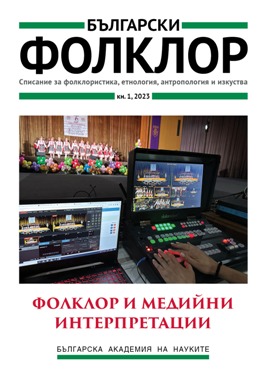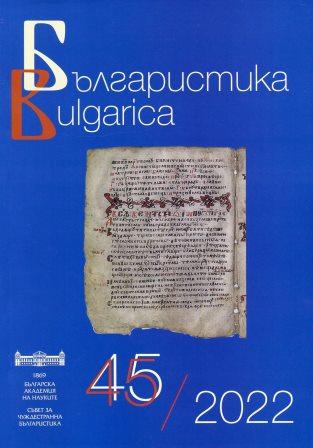
Книги 2021 – 2022
Selected bibliography in the field of Bulgarian Studies published in the current year.
More...We kindly inform you that, as long as the subject affiliation of our 300.000+ articles is in progress, you might get unsufficient or no results on your third level or second level search. In this case, please broaden your search criteria.

Selected bibliography in the field of Bulgarian Studies published in the current year.
More...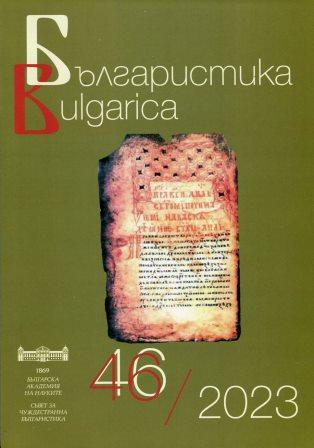
Content of the main Bulgarian scientific journals for the current year in linguistics, literature, history, folklore, ethnography, archaeology and art studies.
More...
Data about scientific events in the field of the humanities in Bulgaria in the first half of 2023.
More...
The Paracel Islands are situated in the South China Sea geographic center and have an important strategic location for the military and the economy. Since 1884, France has represented the Vietnamese state as a protectorate to manage the archipelago. In the context of France seeking to expand its influence into the Asia-Pacific region, disputes over sovereignty over the Paracel Islands occurred during the colonial period between France (representing Vietnam), China, and Japan. The article aims to analyze the importance of the Paracel Islands in the policies of France, China, and Japan in general. Moreover, the specific activities of France in the struggle with China and Japan to affirm and protect sovereignty over the Paracel Islands would also be analyzed. Based on primary and secondary data, along with historical research methods, research methods in international relations, and other interdisciplinary research strategies, the article concludes that the Paracel Islands play an important role in the strategies of France, China, and Japan. Hence, the Paracel issue in this period has gone beyond the framework of traditional territorial disputes, becoming "internationalization” with consequences that persist to the present day. France's policy to exploit and administer the Paracel Islands was persistent, thorough, and systematic in the military, economic, political, and diplomatic spheres.
More...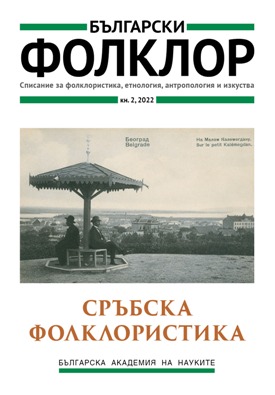
This paper analyses the attitude of Bulgarian researchers towards the phenomenon of bugarštica, with special reference to the book “Croatian Bugarštica Songs and Their Bulgarian Counterparts. Studies and Texts”, edited by Stefana Stoykova and published in 2015 by the Bulgarian Academy of Sciences and the Institute of Ethnology and Folklore Studies with Ethnographic Museum. Stefana Stoykova substantiates the thesis about the Bulgarian origin of the bugarštica, present in the research spanning from Ivan Shishmanov to Antonina Afanasieva-Koleva, by analysing Bulgarian recordings from the 20th century in which, according to Stoykova, traces of bugarštica singing still remain preserved. By analysing the formula “orao se vijaše” [an eagle hovered] and the conceptualization of the falcon figure (in metaphors, as a mythical mediator between the worlds, etc.) in oral lyrical poetry in South Slavic context, this paper uncovers the consonance between bugarštica singing and other genre patterns from the 15th until the 20th century primarily in shared formulas, in style and language, in archaic mythological symbolism. The commonness of these elements is attributed to cohabitation, frequent migrations and the broadest processes of creation and duration in oral epic and lyrical traditions in South Slavic cultures.
More...
This paper explores the position of the rebellious, disobedient hero in his own environment on the examples of South Slavic and Russian epics; more precisely, it explores the hero’s disobedience to an authority from his social or family domain. There is a collision between the heroic status of the hero, emphasizing disobedience, independence and pride, with his social and family status, which lowers the hero on the hierarchical ladder. The hero opposes the will of his superior and sometimes explicitly shows his defiance through special gestures, specific gait or riding, often in the same way as his enemy, but unlike the enemy’s, his arrogance and daring are not always punished. An insubordinate hero is not a frequent type, although often a young hero and a neophyte. Besides, disobedience is not reserved for one and the same characters, although the most disobedient heroes are the greatest Russian hero Ilja Muromec and the greatest South Slavic hero Marko Kraljević. Disobedience is only partially a means of the heroes’ characterization, it is mainly used as a motivation, as an element of the commencement that, through the initial collision, opens the possibility for different variants of the plot, in which, in most poems, the epic prevails over the balladic resolution, the heroism over the punishment for hybris, the heroic over the magical principle.
More...
Phenomena defined in contemporary folkloristics as postfolklore, small groups folklore, urban folklore have for long been out of the focus of Serbian folkloristics, and papers on this topic have only recently started appearing. Quite understandably, the studies are directed towards contemporary material. However, the diachronic aspect of these phenomena exists too. The testimonies of the existence of such forms of folklore in the past can be found in memoir and diary literature, as well as in the corpus of historical (not folkloristic) archives. All these past phenomena are covered here with the umbrella term “other folklore” whose function is descriptive, not theoretical. Everything that folkloristic paradigms in the past failed to see as a “real” folklore (equated with oral, rural, and traditional) – making that material invisible and hidden in the sources less used by folklorists – is classified here as “other.” “Other folklore” in this case encompasses a few kinds of folklore: folklore of small groups (criminals and prisoners, students, seminarists) and urban folklore (mostly connected to Belgrade). Political folklore could belong here too. It is often close to traditional genres in its forms, but historical and political conditions have made it unsuitable and evicted it to the out-of-sight memory of memoirs and diaries (such are, say, monarchist songs from World War II, or political jokes from the time of Communism). Political folklore sometimes coincides with other “otherness” categories, say, the parodic urban folklore from the time of the Nazi occupation of Belgrade that is an example both of political and urban creativity; humoristic and unheroic, it did not fit the folklore of resistance ideal even upon the end of the war. Such a corpus approach makes it possible to see the diachronic background of many contemporary examples and discover new sources of folklore in the less examined material. More importantly, the definitions of folklore themselves are tested by this approach (surely, along the lines of Popper’s criticism of “facts,” it is definitely not a “discovery,” but a re-evaluation of concepts before approaching the corpus). Finally, such analyses can be useful to historians too, because they reveal the hidden side of certain epochs and their mind-sets, as well as the genre conditionality of historical sources.
More...
The Ethnographic Collection, today a part of SASA Archives, was initiated by Stojan Novaković in order to continue Vuk Karadžić’s work on collecting folklore. The goal of the Academy was to get the material collected, systematized and published, and the task of collecting was entrusted to individuals, such as teachers and priests, who lived among the people and were literate enough to record various forms of folklore. The questionnaires they used were intended for ethnographic and anthropogeographic research, which means that there were no clear instructions for recording folk tales. In this paper, I use the term textualization (after Lauri Honko), defined here as secondary, because it refers to the representation of the written (rather than spontaneous oral) text, in order to point out different models/strategies of recording folk tales used by collectors in the last decades of the 19th and first decades of the 20th century. Depending on their position, recording of the folklore material was sometimes influenced by ethnography or dialectology, considering that the mentioned disciplines were on their rise, while the literary model appears as a regional distinction.
More...
Book Review: Савремена српска фолклористика VIII ‒ словенски фолклор и књижевна фантастика. Ур. Дејан Ајдачић и Бошко Сувајџић. Београд: Удружење фолклориста Србије, Универзитетска библи- отека „Светозар Марковић”; Кијев: Комисија за фолклористику Међународног комитета слависта; Лозница: Центар за културу „Вук Караџић”, 2020. 518 стр. ISBN 978-86-7301-149-3
More...
Book Review: Ана Вукмановић. У трагању за извир водом. Слике воде у јужнословенској усменој лирици. Београд: Академска књига, 2020. 296 стр. ISBN 978-86-6263-301-9
More...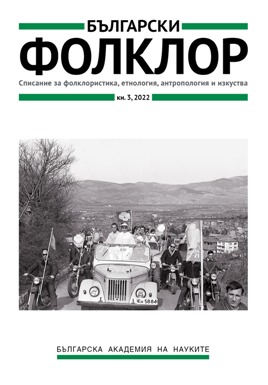
This article aims to outline the main sociocultural aspects of menstruation in Bulgarian traditional culture and folklore. Menarche rituals and etiological legends about the womb’s creation and the menstruation are explored and analyzed in order to define folklore motifs and beliefs. The woman and her cyclicity is related to fertility in the human world. Both in legends and in menarche rituals, the womb and the menstruation are essential for arranging and preserving the dimension between order and chaos, for building a connection between heaven and earth. The magical power of woman's blood and body is included in the cultural system of the human world, but it also aims to achieve prosperity on other levels. This sacred and mysterious physiological process gives woman a special place, makes her wiser and more responsible for the common good.
More...
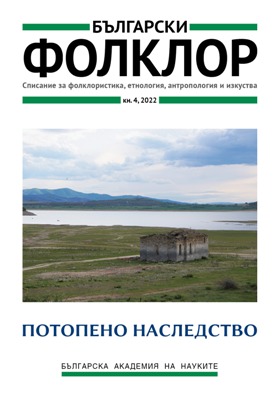
I explore the connections between a particular place that was created by a natural agent (the Yantra River) and an artificial object (the ‘buna’), and the activities by which local people gave the place a specific character. I highlight their past actions and experiences; remembering, recounting and evaluations in the present; the emotional attachment to the place and the ecological nostalgia after its ‘loss’ due to hydro technical intervention.
More...
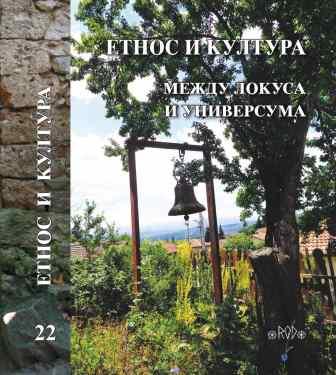
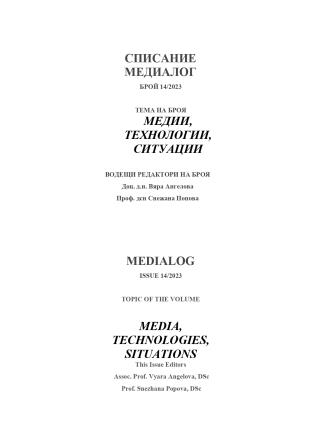
The text explores the digital and documental traces of the journalist Bojan Petrov's on-air legacy, mainly left by his satirical column Fatherland Radio Review. The review was last broadcast on the Politically INcorrect show on the Horizont channel, BNR. There the review was broadcast 7 times from the creation of the programme until the death of its author, but it has a background in previous similar programmes.The analysis traces the problems of the genre definition of fun. Despite the immutable structure of the column and the original approach of the author, inexplicably different interpretations of Petrov's satire lead to its neglect and disappearance.
More...
The use of expert knowledge is an essential part of media communication, especially during crises. The text highlights basic concepts of expertise, knowledge and journalists' understanding of their usage in media. The text analyzes the point of view of experts towards the critical function of journalism in the recognition of expert knowledge and its dissemination. For this purpose, interviews were conducted with 7 experts who participated in interviews and television shows during various crises. The text is part of a dissertation on "Expert speaking during crises and the critical function of journalism".
More...
The monograph is an up-to-date, rich and valuable study of an issue that does not fall often into the focus of media attention. Important for the overall understanding of what is happening in the countries of the Western Balkans is the presentation of the political and public attitudes towards the EU and NATO. The key stages of the Euro-Atlantic integration of the six countries are presented.Desislava Sotirova presents the importance of reconciliation between countries, peoples and ethnic groups, highlights the role and meaning of good neighborliness and regional cooperation, cooperation with the International Tribunal for the former Yugoslavia and the International Tribunal for Kosovo. An important element is the external influence in the region of the Western Balkans, of Russia, China, Turkey and Saudi Arabia.The coverage of the Euro-Atlantic integration of the countries of the Western Balkans was studied through three public media – BNR, Deutsche Welle and BBC. Among the approaches identified by the author in the media coverage, the observation that after the interest has been attracted, the media focus on the internal development of the six countries and out of their interest remains the extent to which the EU and NATO are prepared to accept new members.
More...